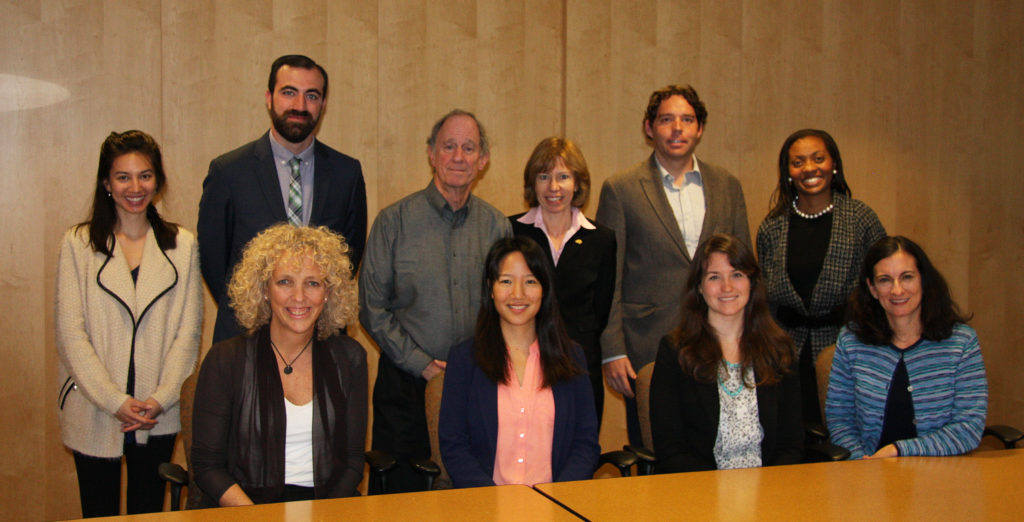RNRF Round Table: The Road To and Through COP21 in Paris
Washington Round Table on Public Policy with Jennifer Morgan, Global Director of WRI’s Climate Program, on October 2, 2015 in Washington, D.C. Here, we present her insights on “The Road To and Through Paris,” discussing the context in which the upcoming United Nations Framework Convention on Climate Change (UNFCCC) negotiations in Paris are taking place, the key elements of a global agreement on mitigating and adapting to climate change, and the role of NGOs.

Pictured seated (L-R): Jennifer Morgan (World Resources Institute), Jennee Kuang (RNRF), Melissa Goodwin (RNRF), Sarene Marshall (Urban Land Institute); standing (L-R): Elizabeth Goldbaum (Geological Society of America), Ian McTiernan (American Institute of Architects), Howard Rosen (Society of Wood Science and Technology), Nancy Somerville (American Society of Landscape Architects), Whitford Remer (American Society of Civil Engineers), Natasha DeJarnett (American Public Health Association); Paul Higgins (American Meteorological Society) and Robert Day (RNRF) present but not pictured.
The Negotiating Landscape
The 21st session of the Conference of the Parties (COP21) to the UNFCCC will be the largest climate negotiation meeting since Copenhagen in 2009 (COP15). Since COP15, the “real economy” and political landscape have both shifted in ways that support a global agreement on climate change.
The economic realities of climate action have changed, particularly for renewables. In 2014, the global economy grew without an accompanying rise in CO2 emissions for the first time. There is increased understanding that economic growth and emissions reductions are not mutually exclusive. Many countries and cities are also recognizing the non-climate benefits of reducing emissions, such as improving public health.
Politically, countries increasingly recognize that taking action on climate change is in their self-interest. Major powers in the G7 and G20 are working together on the challenge. And in the United States, which famously failed to ratify the Kyoto Protocol, President Obama has made climate change a major legacy issue. In particular, President Obama’s joint announcements with Chinese President Xi Jinping have signaled a massive shift in climate action and cooperation. China recently committed $3.1 billion to support developing countries, in addition to shifting towards low-carbon investments.
What to Expect from Paris
While the Kyoto Protocol, adopted in 1997 at COP3 as the first global agreement to mandate country-by-country GHG reductions, was top-down in nature, and the 2009 Copenhagen Accord was bottom-up, Paris will likely produce a hybrid of the two previous approaches. National contributions in the form of intended nationally determined contributions (INDCs) will likely be tied to an international, binding agreement. INDCs are the national post-2020 climate action commitments submitted by both developed and developing countries prior to COP21 in Paris. The four components of the Paris movement are 1) the legal agreement, 2) INDCs, 3) finance, and 4) action by cities, businesses, and investors. The seven core functions of the Paris negotiations will be to:
- Send a clear signal that the transition to a low-carbon economy is inevitable
- Connect the global agreement to the “real economy” and “real people”
- Provide transparency and accountability
- Accelerate investment in low-carbon, climate-resilient economies
- Build a basis for climate action that demonstrates fairness
- Ensure that the vulnerable have the capacity to build resilience and adapt
- Link to science with a sense of urgency
The three key elements of a global agreement, in Paris and beyond, are mitigation, adaptation, and support. With regards to mitigation, the Parties agree on a 2°C target, but this goal needs to be articulated in actionable terms. It is also important to note that the emission reduction commitments made in Paris should represent starting goals that are meant to be heightened over time. Current pledges would only reduce global warming by 1°C. A desired outcome from Paris would be the implementation of 5-year reviews of commitments, during which countries are expected to raise their ambition. On adaptation, a global agreement must build additional support for the poorest countries. As with mitigation, political “moments,” such as 5-year reviews, are needed to scale-up action. Finally, Parties will decide how to address losses and damages inflicted on vulnerable countries as a result of insufficient action on climate change. In terms of support, a global agreement must be able to build capacity for implementation, primarily through financial and technological assistance. In Copenhagen, advanced industrial nations committed to jointly mobilizing $100 billion annually by 2020 to support developing countries. All three of these elements must be underlined by science-based assessment, as well as transparency and accountability.
Negotiations are expected to produce a core legal instrument agreed upon by all 195 Parties to the Convention. This agreement will be associated with the INDCs, but the achievement of these contributions will probably be non-binding internationally. Instead, Parties will likely be subject to measuring, reporting, and verification requirements. Failure to meet stated goals will likely be punishable only through a “name-and-shame” approach.
The Role of NGOs
Finally, Morgan provided insight into the role of NGOs in the negotiation process. She outlined the following:
- Providing technical support, including analysis and recommendations of potential approaches and solutions
- Putting public pressure on governments to be more ambitious on climate action
- Communicating the negotiations process and outcomes to the media and interested individuals
- Working with cities and companies on-the-ground to respond to climate change
- Serving as a facilitator between governments who cannot necessarily communicate directly
COP21 will take place from November 31 to December 11, 2015 in Paris, France. To track global climate action, including submitted INDCs, visit the following:
- CAIT Paris Contributions Map – http://cait.wri.org/indc/
- Climate Action Tracker – http://climateactiontracker.org/about.html
Read about the upcoming negotiations in more detail here.
